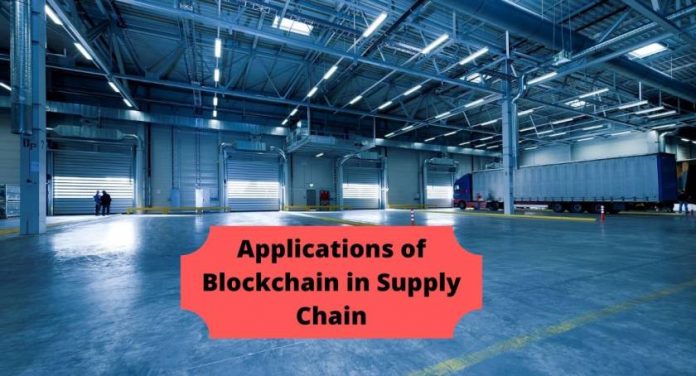The supply chain consists of a complex network of suppliers, manufacturers, distributors, retailers, and consumers. Consequently, a product goes through multiple stages in its supply chain lifecycle. It gets transferred through hundreds of hands, from one geographical location into another. This entire activity may take months.
The supply chain is tricky as it’s extremely difficult for customers or buyers to trace back the product’s origin. As a result, it becomes both intransparent and costly. Besides, due to this opacity, it’s difficult to investigate supply chains whenever the authorities suspect illegal or unethical practices.
Blockchain can help tackle this by bringing visibility and transparency to the table. Thus, it can impact the way transactions are initiated, processed, authorized, recorded and reported. And it can help businesses to save money, energy, and better customer experiences.
How blockchain can help supply chains
Blockchain is a distributed ledger technology, wherein a block records every transaction. These blocks are arranged one after another. The network runs across multiple computers (nodes), thus making it less vulnerable to hacks; it’s also highly transparent. No central authority can control the transactions on the blockchain.
Blockchain can positively impact everything from warehousing to delivery and payment. It can be used for building agreements/smart contracts, tracking, reconciling and payments.
Accordingly, companies can use the technology to reduce forgery and simplify product recall. In case a product is faulty, a manufacturer will be able to locate affected products quickly and easily. Money-wise, this will make recalls less expensive.
Below are the few qualities which are an integral part of any supply chain process and that blockchain supports:
Compliance
In a global operational environment, companies need to be compliant with a broad range of international regulations. That said, the digitization of global commerce has produced new complexities; the volume and complexity of transactions are also increasing. Blockchain can help address these issues. It can ensure automated compliance and reporting, which will reduce friction and reporting costs as well as eliminate errors associated with manual activities.
The technology can further enhance corporate governance by providing information in real-time and seamlessly distributing data to the proper stakeholders. Important areas where blockchain could improve compliance and reporting include medical devices, prescriptions, manufacturers, and other consumer goods.
Besides, data on the blockchain is practically immutable, i.e it cannot be changed or deleted. That is why blockchain can be used as a document or proof for the transfer of any digital asset.
Ownership and licensing
When it comes to expensive assets like real estate, cars, art, it’s important to record information about them in a most accurate manner. This is necessary in order to:
- protect owners’ rights (e.g. in case of theft)
- resolve disputes
- check correct transfer of ownership to a new owner after-sale
- prevent sales of frauds
All in all, it is very important to maintain a correct and complete record so that it can be prevented from unauthorized and fraudulent changes. That said, blockchain provides standardized licensing procedures in various industries. With the use of smart contracts, services, products, software, etc licensing can be done automatically.
Reliability and integrity
Reliability and integrity are also very important in the supply chain. The fact that all active blockchain nodes maintain full copies of the blockchain ledger is crucial in this regard. Hence, if one node is attacked, the data is still retained by other nodes, making the system reliable.
Besides, since there is no single point of failure, the network’s integrity and reliability will remain intact irrespective of who is running the nodes.
Transparency
Everyone in the supply chain — the supplier, the buyer, the warehouse and the end-user — have the chance to find out what’s happening to the product when it’s being transported. As a result, the producers can be sure that the label correctly reflects what’s inside the product.
Besides, customers will also sync with companies with whom they share the same values of environmental stewardship and sustainable manufacturing.
Privacy
Can transparency and privacy go hand in hand? In fact, yes. Users on blockchain can stay anonymous. This way, they are more comfortable with the idea of sharing data and far more open in the way they interact with the technology.
Accordingly, the benefits of adopting blockchain technology in the supply chain industry are:
- Reduce or eliminate fraud and errors
- Improve inventory management
- Minimize courier costs
- Reduce delays from paperwork
- Identify issues faster
- Increase consumer and partner trust
- Transparency into the provenance of consumer goods— from the source point to the end-user
- Asset tracking
- Licensing of services, products, and software
Blockchain use cases in supply chain
Some of the examples include
- Walmart uses blockchain to keep track of its pork sources in China. The blockchain records include information about the origin of meat, processing, storage and sell-by date.
- Australian vehicle manufacturer Tomcar uses Bitcoin to pay its suppliers. Currently, three partners in Israel and Taiwan accept such payments.
- Diamond-giant De Beers uses blockchain technology to track stones from the mining point to the store. This way, the company avoids “blood diamonds” and assures the consumers about the product’s authenticity.
Conclusion
Blockchain is just beginning to enter the supply chain realm. There are many interesting examples of its usage on the market, for example, VeChain. There are also projects like Tael (formerly Wabi), Te-Food, Ambrosus, Origin Trail, Accenture, etc
Stay with Altcoin Buzz as we try to cover the advancements in the coming days.
Join us on Telegram to receive free trading signals.
For more cryptocurrency news, check out the Altcoin Buzz YouTube channel.




























